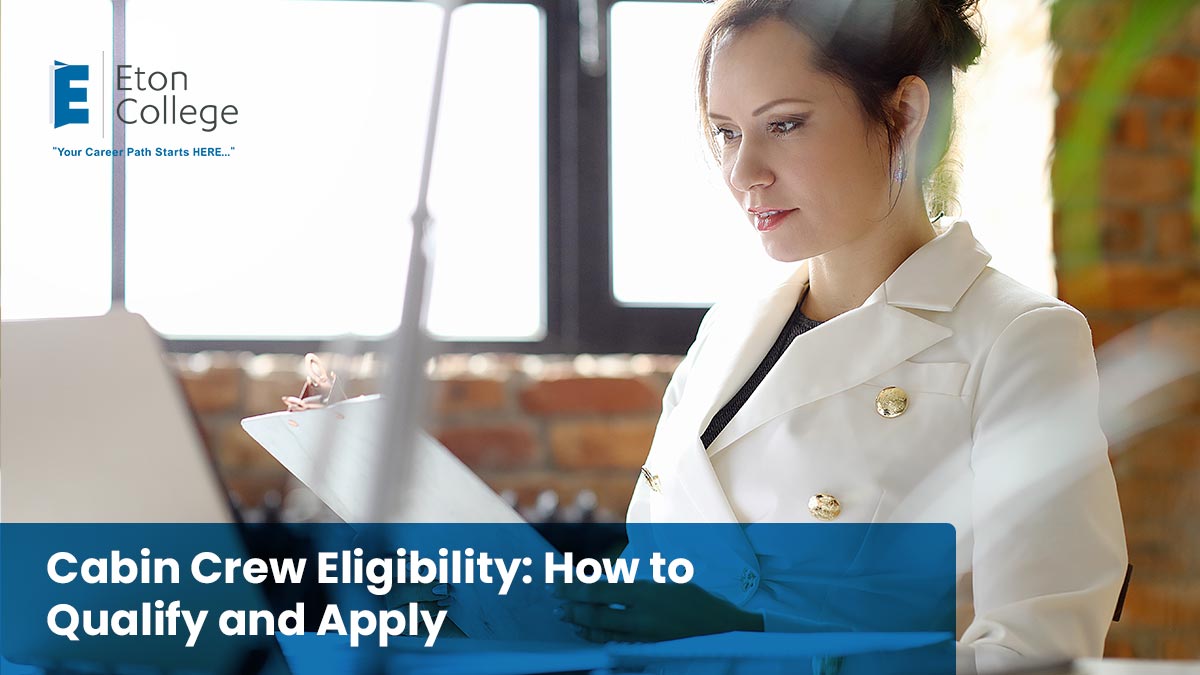Key Takeaways
- The age limit for cabin crew positions is typically set at 18 years.
- Most airlines require a high school diploma, while further education can be beneficial.
- Extensive training is provided by airlines to ensure safety and customer service.
- Eton College’s program offers valuable training and resources for aspiring cabin crew members.
Aspiring to work as a cabin crew member in the aviation sector is an exciting prospect, marked by unique experiences and challenges. This role is not only about serving meals and assisting passengers but also involves ensuring their safety and comfort during their journey. However, before one can don the uniform and join the ranks of this dynamic profession, there are essential eligibility criteria to consider.
Related:What is a Cabin Crew?
Understanding Cabin Crew Eligibility
1. Age Limit
One of the first considerations for those looking to pursue a career in this field is the age limit. The majority of airlines mandate that applicants must be a minimum of 18 years of age. This requirement aligns with the legal aspects of employment and ensures that candidates possess the maturity needed to handle various situations on board. Additionally, some airlines may prefer candidates who are older, as this can indicate more life experience and adaptability. For instance, airlines often look for individuals who can navigate complex social interactions and remain composed in stressful situations—qualities that typically improve with age.
2. Educational Requirements
While specific educational requirements can vary by airline, most require at least a high school diploma or its equivalent. This foundational level of education is crucial for understanding the basic aspects of the job and communicating effectively with passengers. Some airlines may also prefer candidates with post-secondary education or additional certifications related to customer service, hospitality, or safety. For example, a degree in hospitality management can be a significant asset, as it provides essential insights into guest relations and service excellence. Education not only provides foundational knowledge but also helps develop crucial skills necessary for this role.
3. Training
Upon selection, candidates undergo extensive training provided by the airline. This training covers various aspects, including in-flight safety, emergency procedures, and passenger service protocols. Training programs often include hands-on experiences that prepare candidates for real-life scenarios, ensuring they can handle any situation that may arise during a flight. Typically, the training duration ranges from a few weeks to several months, depending on the airline’s specific requirements and the complexity of its operations. In addition to classroom instruction, trainees may participate in simulations and role-playing exercises to refine their skills in a controlled environment.
Essential Skills for Success
To thrive in this career, individuals must possess a range of skills, including strong communication, teamwork, and problem-solving abilities. Cabin crew members frequently interact with passengers, making effective communication essential for ensuring a smooth flying experience. This includes everything from explaining safety procedures to addressing passenger concerns. Additionally, teamwork is vital, as cabin crew must collaborate seamlessly with each other and the flight deck crew.
Moreover, strong customer service skills are imperative. Cabin crew members often serve as the face of the airline, and their interactions with passengers can influence the overall perception of the airline’s brand. Training in customer service can help candidates develop the skills necessary to handle difficult situations, ensuring that passengers feel valued and respected throughout their journey.
Eton College’s Flight Attendant Preparation Program
For those committed to pursuing this exciting career path, Eton College offers a comprehensive flight attendant program designed to equip students with the skills and knowledge necessary to excel in the aviation industry. The program encompasses critical areas such as in-flight safety, emergency protocols, and exceptional customer service. With a curriculum tailored to meet industry standards, students receive practical training that enhances their employability.
In addition to the core subjects, Eton College emphasizes the importance of personal development, including grooming, communication skills, and cultural awareness. These components are vital for students aiming to work in a diverse, international environment. Furthermore, the program includes opportunities for hands-on experience through internships or partnerships with airlines.
Preparing for Your Application
When applying for cabin crew positions, candidates should ensure their application stands out. Here are some job search tips to consider:
- Tailor Your Resume: Highlight relevant experiences, education, and skills that align with the job description. Use specific keywords that resonate with the airline’s values and requirements.
- Prepare for Interviews: Familiarize yourself with common interview questions and practice your responses. Emphasize your passion for customer service and safety. Conduct mock interviews to build confidence and refine your delivery.
- Network: Utilize industry connections and attend job fairs to learn about potential opportunities. Networking can often lead to valuable recommendations and insider information about job openings.
- Stay Informed: Keep abreast of trends in the aviation industry. Understanding current issues, such as airline safety protocols or customer service innovations, can provide a competitive edge during interviews.
- Develop a Professional Online Presence: Utilize platforms like LinkedIn to showcase your skills, experiences, and aspirations. Having connections to various industry professionals can unlock doors to new opportunities.
Related:Can I Choose A Flexible Schedule For Cabin Crew Training?
Embarking on a career as a cabin crew member offers a world of opportunities for personal and professional growth. Understanding the cabin crew eligibility criteria is essential for anyone looking to enter this field. By meeting the age limit, fulfilling educational requirements, and undergoing training, aspiring candidates can position themselves for success.
FAQs
- What is the age limit to apply for cabin crew positions?
Most airlines require candidates to be at least 18 years old. - Are there any educational requirements for becoming cabin crew?
While a high school diploma is often sufficient, some airlines prefer candidates with post-secondary education. - What kind of training do cabin crew members undergo?
Training typically includes in-flight safety, emergency procedures, and customer service protocols. - How can Eton College help me become a cabin crew member?
Eton College offers a comprehensive program that equips students with the necessary skills and knowledge for a successful career in aviation. - What skills are essential for cabin crew members?
Key skills include strong communication, teamwork, problem-solving abilities, and customer service.




